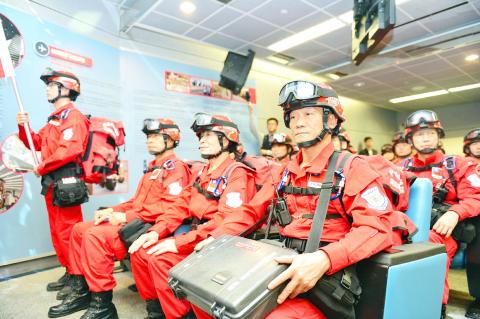Dozens of Taiwanese disaster relief and healthcare workers, representatives of charity groups and a medical team led by government officials yesterday left for Nepal, but Taiwan is still waiting for permits from Kathmandu to send search-and-rescue teams, authorities said.
A 37-member team from the Buddha’s Light International Association and physicians and nurses from Kaohsiung Chang Gung Memorial Hospital left in the morning, taking 5 tonnes of relief supplies, including blankets, tents, dried foods and medical supplies.
The team is scheduled to stay in Nepal for five days, International Headquarters Search and Rescue head Lu Cheng-tsung (呂正宗) said.

Photo: Yao Kai-shiou Taipei Times
Six medical personnel from the government-sponsored Taiwan International Health Action led by a Ministry of Health and Welfare official and accompanied by two Ministry of Foreign Affairs officials familiar with the situation in Nepal left in the afternoon.
Representative to India James Tien (田中光), who has been in Kathmandu since the earthquake on Saturday, would assist the relief workers if needed, foreign ministry spokesperson Anna Kao (高安) said.
Kathmandu has not yet accepted Taiwan’s offer to send official search-and-rescue teams.
Deputy Minister of Foreign Affairs Andrew Kao (高振群) on Monday said that Kathmandu has asked for search-and-rescue help only from neighbors such as China, India and Pakistan, and cited the great distance and the lack of direct flights and diplomatic relations for the handling of Taiwan’s offer.
Early yesterday at a regular news conference, Ministry of National Defense spokesperson David Lo (羅紹和) said the ministry has had everything ready to dispatch C-130 aircraft from Pingtung County to Nepal.
However, anonymous sources at the defense ministry said it would be more efficient to deliver aid via commercial flights than military aircraft because it would take the C-130s 11 to 14 hours to reach Nepal as they would have to fly over open ocean instead of crossing China’s airspace, the sources said.
The lack of diplomatic relations with most nations in the region would also create problems if they were to allow the aircraft through their airspace or grant them necessary refueling stops en route to Nepal, the sources added.

SECURITY: As China is ‘reshaping’ Hong Kong’s population, Taiwan must raise the eligibility threshold for applications from Hong Kongers, Chiu Chui-cheng said When Hong Kong and Macau citizens apply for residency in Taiwan, it would be under a new category that includes a “national security observation period,” Mainland Affairs Council (MAC) Minister Chiu Chui-cheng (邱垂正) said yesterday. President William Lai (賴清德) on March 13 announced 17 strategies to counter China’s aggression toward Taiwan, including incorporating national security considerations into the review process for residency applications from Hong Kong and Macau citizens. The situation in Hong Kong is constantly changing, Chiu said to media yesterday on the sidelines of the Taipei Technology Run hosted by the Taipei Neihu Technology Park Development Association. With

CARROT AND STICK: While unrelenting in its military threats, China attracted nearly 40,000 Taiwanese to over 400 business events last year Nearly 40,000 Taiwanese last year joined industry events in China, such as conferences and trade fairs, supported by the Chinese government, a study showed yesterday, as Beijing ramps up a charm offensive toward Taipei alongside military pressure. China has long taken a carrot-and-stick approach to Taiwan, threatening it with the prospect of military action while reaching out to those it believes are amenable to Beijing’s point of view. Taiwanese security officials are wary of what they see as Beijing’s influence campaigns to sway public opinion after Taipei and Beijing gradually resumed travel links halted by the COVID-19 pandemic, but the scale of

A US Marine Corps regiment equipped with Naval Strike Missiles (NSM) is set to participate in the upcoming Balikatan 25 exercise in the Luzon Strait, marking the system’s first-ever deployment in the Philippines. US and Philippine officials have separately confirmed that the Navy Marine Expeditionary Ship Interdiction System (NMESIS) — the mobile launch platform for the Naval Strike Missile — would take part in the joint exercise. The missiles are being deployed to “a strategic first island chain chokepoint” in the waters between Taiwan proper and the Philippines, US-based Naval News reported. “The Luzon Strait and Bashi Channel represent a critical access

Pope Francis is be laid to rest on Saturday after lying in state for three days in St Peter’s Basilica, where the faithful are expected to flock to pay their respects to history’s first Latin American pontiff. The cardinals met yesterday in the Vatican’s synod hall to chart the next steps before a conclave begins to choose Francis’ successor, as condolences poured in from around the world. According to current norms, the conclave must begin between May 5 and 10. The cardinals set the funeral for Saturday at 10am in St Peter’s Square, to be celebrated by the dean of the College